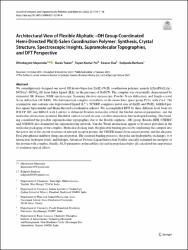Architectural View of Flexible Aliphatic –OH Group Coordinated Hemi‑Directed Pb(II)‑Salen Coordination Polymer: Synthesis, Crystal Structure, Spectroscopic Insights, Supramolecular Topographies, and DFT Perspective
Date
27.01.2022Metadata
Show full item recordCitation
Dhrubajyoti Majumdar1,2 · Burak Tüzün3 · Tapan Kumar Pal4 · Sourav Das5 · Kalipada Bankura1 Received: 3 October 2021 / Accepted: 8 December 2021 / Published online: 27 January 2022 © The Author(s), under exclusive licence to Springer Science+Business Media, LLC, part of Springer Nature 2021Abstract
We serendipitously designed one novel 1D hetero-binuclear Zn(II)-Pb(II) coordination polymer, namely [(Zn)(Pb)(L)(η1–
NCS)(η1–SCN)]n (1) from Salen ligand (
H3L) in the presence of NaSCN. The complex was structurally characterized by
elemental, IR, Raman, NMR spectroscopy, Scanning electron microscope, Powder X-ray diffraction, and Single-crystal
X-ray diffraction (SCXRD). The heteronuclear complex crystallizes in the monoclinic space group P21/c with Z = 4. The
asymmetric unit contains one deprotonated ligand (
L2−). SCXRD comprises metal ions of Zn(II) and Pb(II), fulfilled perfect
square bipyramidal and Hemi-directed coordination spheres. We accomplished DFT by three different level basis set
B3LYP, HF, and M062X with Lanl2dz to delineate Frontier molecular orbital, the Global chemical parameters, and the
molecular electrostatic potential. Hirshfeld surface carried out non-covalent interactions like hydrogen bonding. This bonding
considered the possible supramolecular topographies due to the flexible aliphatic –OH group. Besides H/H, C/H/H/C
and N/H/H/N also dominated the supramolecular network. Van der Waals interactions appear to be more prevalent in the
molecular packaging of the complex. Molecular docking finds the plausible binding process by implanting the complex into
the active site of the crystal structures of estrogen receptor protein, the VEGFR kinase (liver cancer) protein, and the allosteric
Eya2 phosphatase inhibitor (lung cancer) protein. The essential binding process is the polar and hydrophobic exchanges, π–π
interaction, hydrogen bonds, and halogen. Advanced Protein–Ligand Interaction Profiler crucially examined the interplay of
the protein with complex. Finally, NLO parameters polarizability (α) and hyperpolarizability (β) calculated the importance
of nonlinear optical effects.















